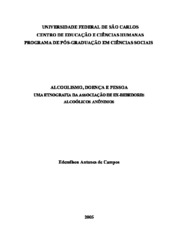Alcoolismo, doença e pessoa: uma etnografia da associação de ex-bebedores Alcoólicos Anônimos.

Visualizar/
Data
2005-09-20Autor
Campos, Edemilson Antunes de
Metadata
Mostrar registro completoResumo
The major aim of this thesis is to introduce a reflection of the therapeutic model built by the Alcoholics Anonymous (A.A.) fellowship to care for the so-called alcoholism disease and to relate this model to the construction of the notion of the person as it appears in this model, since it is related to the construction of the identity of an alcoholic in recovery .
Based on an ethnographic research carried out in the Sapopemba A.A. group located in the outskirts of the city of São Paulo, we attempt to analyze the problem of alcoholism
from an emic perspective, i.e., as it is thought of and managed by those who acknowledge themselves as alcoholics . In this way we try to articulate the representations built on alcohol and alcoholism by re-constructing the notion of alcoholic person, in order to set contrasts with the ideological field of modern individualism.
The thesis also looks for to demonstrate that, for A.A. members, the alcoholic disease is understood as a family disease , i.e., a disease that not only concerns the individuals but also affects those around them, family members most of all. In fact, the possibility of contagion around alcoholism is clearly identifiable. Such condition is directly linked to representations built on alcoholism, understood as a physical and moral disease. It is also linked to its effects on the set of social relationships both familial and professional in which the ex-drinker is involved. In their activities and meetings, the members of the fellowship acknowledge themselves as alcoholics in recovery , i.e., as carriers of an incurable disease, a disorder housed inside each of them with which they must learn to deal. Fundamentally, this process corresponds to setting a peculiar regime of alterity, based on the construction of an ill body and soul, in which ex-drinker is seen as another person that each alcoholic carries within; this condition must be shared with the other group members to facilitate preservation of soberness and recuperation of social bonds that were lost in the times of active alcoholism, particularly within the family and in the workplace.